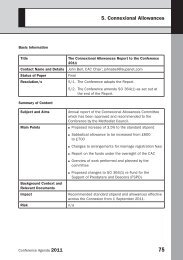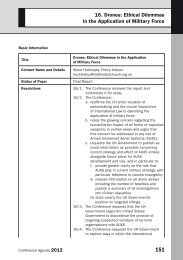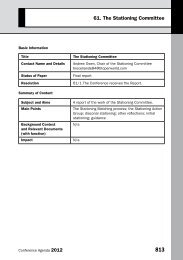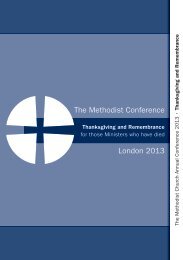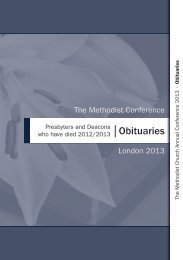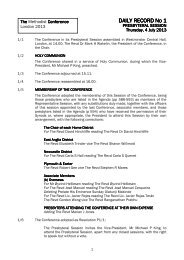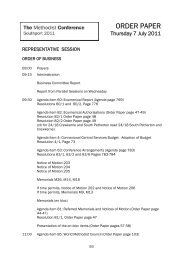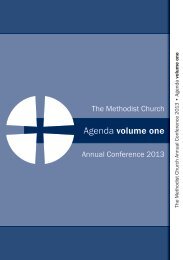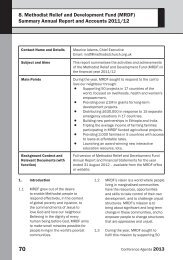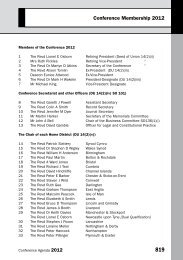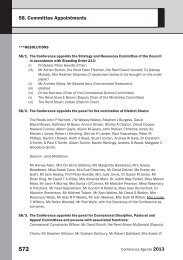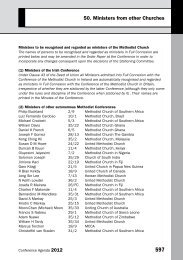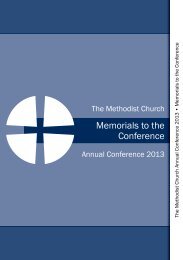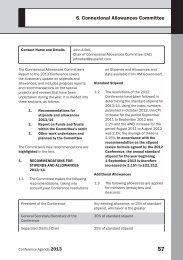Agenda Volume 3 - Methodist Conference
Agenda Volume 3 - Methodist Conference
Agenda Volume 3 - Methodist Conference
You also want an ePaper? Increase the reach of your titles
YUMPU automatically turns print PDFs into web optimized ePapers that Google loves.
57. The Fruitful Field Project<br />
reports, conducting interviews at the<br />
required stages, and recommending<br />
continuance on trial and readiness<br />
for admission as a Local Preacher.<br />
Recently, a number of alternative<br />
pathways have been developed<br />
and appropriately authorised.<br />
Currently seven such courses are<br />
in existence. Some are based in<br />
learning institutions, and some<br />
carry university validation. Some are<br />
ecumenical programmes developed by<br />
Regional Training Partnerships; others<br />
are <strong>Methodist</strong> courses offered by a<br />
particular District. Those who have<br />
previously completed other courses<br />
or have relevant experience can apply<br />
for exemptions from units of the Faith<br />
& Worship course by applying for<br />
accreditation of prior experience and<br />
learning (APEL). To be granted APEL,<br />
evidence is required to show that<br />
prior learning meets all the learning<br />
outcomes of units from which they<br />
are requesting exemption. Because<br />
of the particular way those learning<br />
outcomes are expressed, and also<br />
because of the way in which Faith &<br />
Worship units combine theory and<br />
practice, it can be difficult to grant<br />
exemptions. As well as successfully<br />
completing a course, preachers on<br />
trial must also successfully complete<br />
two Circuit interviews held at the Local<br />
Preachers’ Meeting, which will draw on<br />
an assessment of two trial services.<br />
There are currently approximately<br />
1,500 preachers on note and on trial<br />
across the Connexion.<br />
53 The Worship Leaders’ Training Pack is<br />
the connexionally approved pathway<br />
offered to those becoming Worship<br />
Leaders. This was first published<br />
in 1996, and consists of seven<br />
sessions designed for use in a small<br />
study group. There is no formal<br />
assessment. Appointment as a<br />
Worship Leader is subject to triennial<br />
review.<br />
Other pathways and opportunities<br />
54 Beyond these major pathways, several<br />
other pathways and opportunities<br />
have recently been supported, or are<br />
currently supported, by connexional<br />
resources. These include:<br />
54.1 Foundation Training: This was<br />
adopted by the 1999 <strong>Conference</strong> as<br />
a pathway for those “judged to have<br />
a strong sense of Christian vocation<br />
to exercise their discipleship through<br />
some form of ordained or authorised<br />
lay ministry,” and aimed “to enable<br />
the particular form of vocation and<br />
the person’s ability to exercise it to<br />
be more accurately discerned.”<br />
54.2 Extending Discipleship, Exploring<br />
Vocation (EDEV): A successor to<br />
Foundation Training adopted by<br />
the 2006 <strong>Conference</strong>, EDEV was<br />
envisaged as “a new approach<br />
to exploration of discipleship and<br />
vocation for a wider group of people,<br />
located closer to their home Circuit<br />
or area, with the support of training<br />
institutions.” Connexional funds<br />
were made available to support the<br />
development of EDEV across Regional<br />
Training Networks for three years from<br />
September 2008.<br />
<strong>Conference</strong> <strong>Agenda</strong> 2012 661



